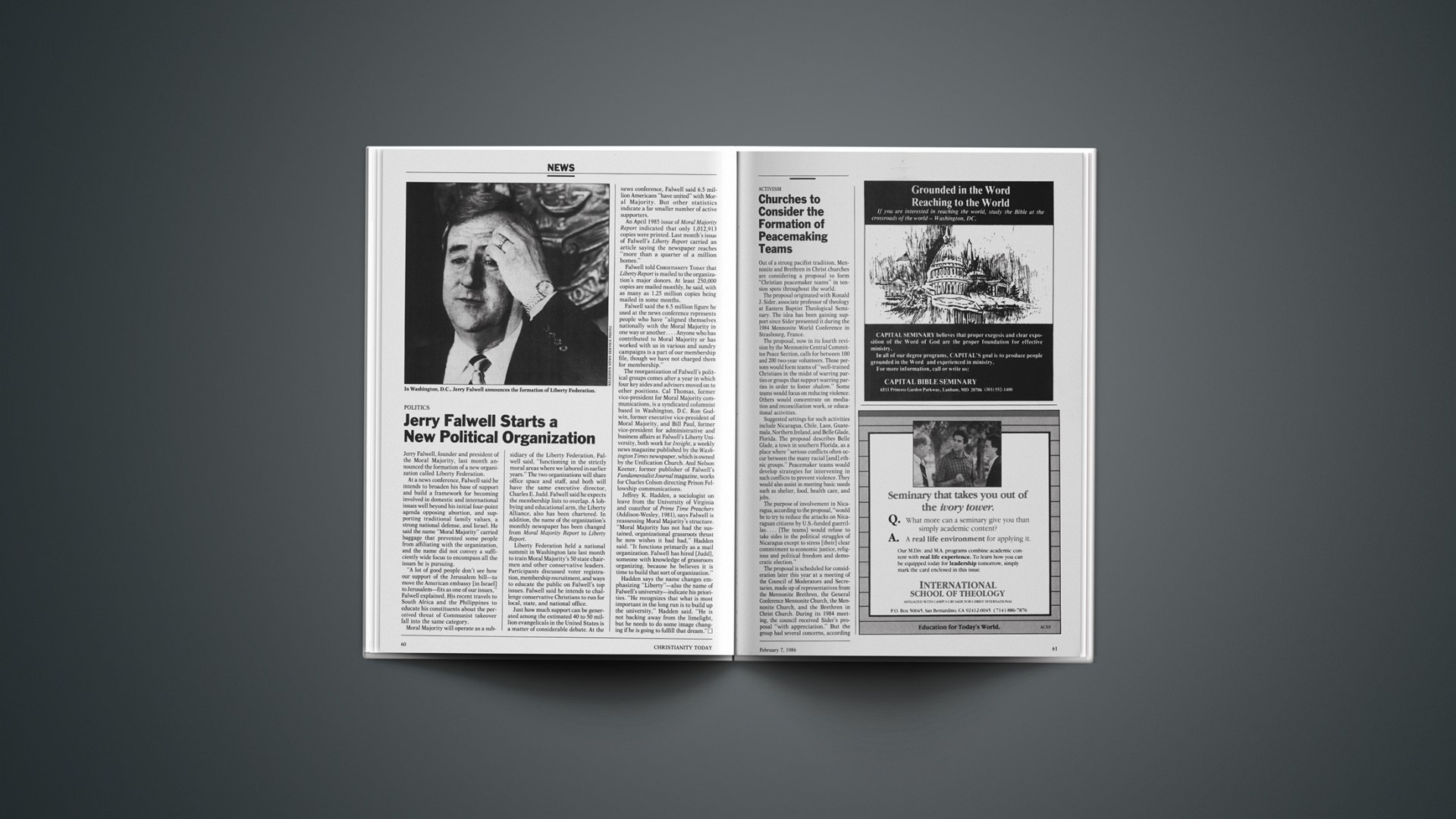Jerry Falwell, founder and president of the Moral Majority, last month announced the formation of a new organization called Liberty Federation.
At a news conference, Falwell said he intends to broaden his base of support and build a framework for becoming involved in domestic and international issues well beyond his initial four-point agenda opposing abortion, and supporting traditional family values, a strong national defense, and Israel. He said the name “Moral Majority” carried baggage that prevented some people from affiliating with the organization, and the name did not convey a sufficiently wide focus to encompass all the issues he is pursuing.
“A lot of good people don’t see how our support of the Jerusalem bill—to move the American embassy [in Israel] to Jerusalem—fits as one of our issues,” Falwell explained. His recent travels to South Africa and the Philippines to educate his constituents about the perceived threat of Communist takeover fall into the same category.
Moral Majority will operate as a subsidiary of the Liberty Federation, Falwell said, “functioning in the strictly moral areas where we labored in earlier years.” The two organizations will share office space and staff, and both will have the same executive director, Charles E. Judd. Falwell said he expects the membership lists to overlap. A lobbying and educational arm, the Liberty Alliance, also has been chartered. In addition, the name of the organization’s monthly newspaper has been changed from Moral Majority Report to Liberty Report.
Liberty Federation held a national summit in Washington late last month to train Moral Majority’s 50 state chairmen and other conservative leaders. Participants discussed voter registration, membership recruitment, and ways to educate the public on Falwell’s top issues. Falwell said he intends to challenge conservative Christians to run for local, state, and national office.
Just how much support can be generated among the estimated 40 to 50 million evangelicals in the United States is a matter of considerable debate. At the news conference, Falwell said 6.5 million Americans “have united” with Moral Majority. But other statistics indicate a far smaller number of active supporters.
An April 1985 issue of Moral Majority Report indicated that only 1,012,913 copies were printed. Last month’s issue of Falwell’s Liberty Report carried an article saying the newspaper reaches “more than a quarter of a million homes.”
Falwell told CHRISTIANITY TODAY that Liberty Report is mailed to the organization’s major donors. At least 250,000 copies are mailed monthly, he said, with as many as 1.25 million copies being mailed in some months.
Falwell said the 6.5 million figure he used at the news conference represents people who have “aligned themselves nationally with the Moral Majority in one way or another.… Anyone who has contributed to Moral Majority or has worked with us in various and sundry campaigns is a part of our membership file, though we have not charged them for membership.”
The reorganization of Falwell’s political groups comes after a year in which four key aides and advisers moved on to other positions. Cal Thomas, former vice-president for Moral Majority communications, is a syndicated columnist based in Washington, D.C. Ron Godwin, former executive vice-president of Moral Majority, and Bill Paul, former vice-president for administrative and business affairs at Falwell’s Liberty University, both work for Insight, a weekly news magazine published by the Washington Times newspaper, which is owned by the Unification Church. And Nelson Keener, former publisher of Falwell’s Fundamentalist Journal magazine, works for Charles Colson directing Prison Fellowship communications.
Jeffrey K. Hadden, a sociologist on leave from the University of Virginia and coauthor of Prime Time Preachers (Addison-Wesley, 1981), says Falwell is reassessing Moral Majority’s structure. “Moral Majority has not had the sustained, organizational grassroots thrust he now wishes it had had,” Hadden said. “It functions primarily as a mail organization. Falwell has hired [Judd], someone with knowledge of grassroots organizing, because he believes it is time to build that sort of organization.”
Hadden says the name changes emphasizing “Liberty”—also the name of Falwell’s university—indicate his priorities. “He recognizes that what is most important in the long run is to build up the university,” Hadden said. “He is not backing away from the limelight, but he needs to do some image changing if he is going to fulfill that dream.”










